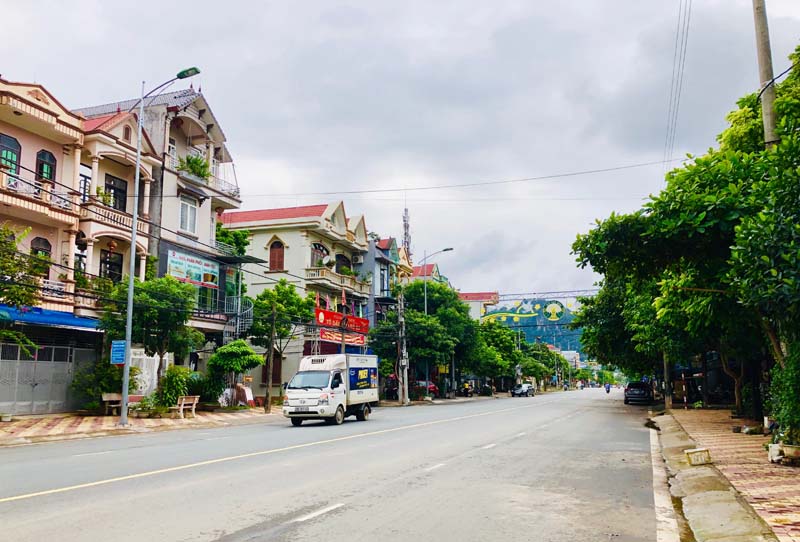
(HBO) - Tan Thinh, one of the central wards of Hoa Binh city, has recorded positive achievements in socio-economic development and in improving the material and spiritual life of local residents over the last five years.
 Transport
infrastructure in Tan Thinh ward (Hoa Binh city) has been upgraded, bringing a
new look to the ward.
Transport
infrastructure in Tan Thinh ward (Hoa Binh city) has been upgraded, bringing a
new look to the ward.
Over the last five years, the Party Committee and the People's
Committee of the ward directed, encouraged and maintained production and
business activities.
In 2019, as many as 931 households and individuals in the ward engaged in service
and business activities, creating jobs for 1,437 workers, and generating total revenue
of over 2.2 trillion VND, up 356 businesses and over 1 billion VND in revenue compared
to the beginning of the local Party Committee’s term.
The industrial and handicraft sector also achieved good
growth. The ward has 53 handicraft and small industrial production establishments
with 139 workers, generating total revenue of 543 billion VND, equivalent to 112
percent of the target set in the resolution of the local Party congress for
2015-2020 term.
The local authority has also paid attention to developing agriculture and forestry
sector, focusing on producing plants and animals to serve the needs of local
people and those in neighbouring wards, and improving the quality of
agricultural products towards larger markets both in and outside the country.
The ward has completed and exceeded 12 targets set in the resolution. The
percentage of poor households in the ward dropped to 0.62 percent. 80 percent
of agencies, units, schools, and residential groups met cultural standards. About
330 local labourers were provided with jobs per year.
The outcomes laid the solid foundations for the ward’s
Party Congress in the 2020-2025 term set higher targets. The ward aims to
increase the annual per capita income to 130 million VND in 2025. The State
budget collection is expected to rise by 10 percent per year, while the
percentage of poor households is projected to drop under 0.6 percent,
contributing to turning the ward into one of the socio-economic centres of Hoa
Binh city in particular and the province in general./.
The Standing Board of the Hoa Binh provincial Party Committee has agreed in principle on a proposal by the Standing Board of the Party Committee of Hoa Binh city to gather feedback on the city’s 1:2000 zoning plan, which forms part of its broader urban development strategy.
Hoa Binh province has made notable progress in public administration reform and digital government development, with the satisfaction index among citizens and businesses reaching over 84%, according to recent government evaluations.
Thanks to great efforts by local authorities in recent times, the governance and public administration performance of Mai Chau district has been significantly improved.
In the afternoon of June 6, the Party Committee, the People's Council, the People's Committee and the Fatherland Front of Lac Son district solemnly held a meeting to celebrate the 139th anniversary of the district's founding (1886–2025) and the 79th anniversary of the establishment of the district's Party Committee (1946–2025). There was the attendance of Mr. Bui Van Thang, the Vice Chairman of the Provincial People's Council; Mr. Quach Tat Liem, the Vice Chairman of the Provincial People's Committee; Ms. Dang Bich Ngoc, the Deputy Head of the National Assembly Delegation of the province; as well as the former leaders of the province and district through various periods, who are the natives of the district.
Implementing the Politburo’s Resolution No. 57-NQ/TW on breakthroughs in science – technology, innovation, and digital transformation is a golden opportunity for the northern mountainous province of Hoa Binh to renew growth model, improve competitive edge and shorten digital gap.
Resolution 57-NQ/TW, issued by the Politburo on December 22, 2024, identifies sci-tech, innovation, and digital transformation as strategic breakthroughs to build a developed and prosperous nation. In Hoa Binh province, this spirit is not just a slogan, it’s being put into action through concrete initiatives that form a "new development triangle”: digital citizenship, digital economy, and digital administration.



 Transport
infrastructure in Tan Thinh ward (Hoa Binh city) has been upgraded, bringing a
new look to the ward.
Transport
infrastructure in Tan Thinh ward (Hoa Binh city) has been upgraded, bringing a
new look to the ward.